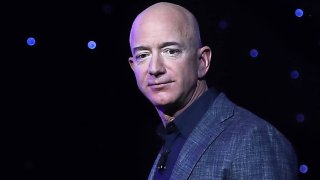
- Blue Origin has lost more than a dozen key leaders and top engineers this summer, CNBC has learned, with most leaving in the weeks after founder Jeff Bezos' spaceflight.
- Several of the engineers who left were part of Blue Origin's astronaut lunar lander program. Earlier this year Blue Origin lost its bid for a valuable NASA development contract.
- Shortly after Bezos' spaceflight, Blue Origin gave all its full-time employees a $10,000, no-strings-attached cash bonus, multiple people familiar with the situation told CNBC.
Jeff Bezos flew to space late last month, but his company has lost top talent since the billionaire space founder came back to Earth.
At least 17 key leaders and senior engineers have left Blue Origin this summer, CNBC has learned, with many moving on in the weeks after Bezos' spaceflight.
Two of the engineers, Nitin Arora and Lauren Lyons, this week announced jobs at other space companies: Elon Musk's SpaceX and Firefly Aerospace, respectively.
Feeling out of the loop? We'll catch you up on the Chicago news you need to know. Sign up for the weekly Chicago Catch-Up newsletter here.
Others quietly updated their LinkedIn pages over the past few weeks.
Each unannounced departure was confirmed to CNBC by people familiar with the matter. Those departures include: New Shepard senior vice president Steve Bennett, chief of mission assurance Jeff Ashby (who retired), national security sales director Scott Jacobs, New Glenn senior director Bob Ess, New Glenn first stage senior director Tod Byquist, New Glenn senior finance manager Bill Scammell, senior manager of production testing Christopher Payne, New Shepard technical project manager Nate Chapman, senior propulsion design engineer Dave Sanderson, senior HLS human factors engineer Rachel Forman, BE-4 controller lead integration and testing engineer Jack Nelson, New Shepard lead avionics software engineer Huong Vo, BE-7 avionics hardware engineer Aaron Wang, propulsion engineer Rex Gu, and rocket engine development engineer Gerry Hudak.
Those who announced they were leaving Blue Origin did not specify why, but frustration with executive management and a slow, bureaucratic structure is often cited in employee reviews on job site Glassdoor.
Money Report
A company spokesperson emphasized Blue Origin's growth in a statement to CNBC.
"Blue Origin grew by 850 people in 2020 and we have grown by another 650 so far in 2021. In fact, we've grown by nearly a factor of four over the past three years. We continue to fill out major leadership roles in manufacturing, quality, engine design, and vehicle design. It's a team we're building and we have great talent," the spokesperson said.
Some of the engineers who left were part of Blue Origin's astronaut lunar lander program. Bezos' company lost its bid for a valuable NASA development contract in April when SpaceX was announced as the sole awardee under the space agency's Human Landing System program, winning a $2.9 billion contract.
But, despite the Government Accountability Office last month denying Blue Origin's protest of NASA's decision, the company has continued to escalate its fight to be a part of the HLS program. Blue Origin first launched a public relations offensive against SpaceX's Starship rocket and then, on Monday, sued NASA in federal court.
A $10,000 bonus

The company has nearly 4,000 employees around the U.S., with its headquarters in Kent, Washington, near Seattle, as well as facilities in Cape Canaveral, Florida; Van Horn, Texas, and Huntsville, Alabama.
Ten days after Bezos' July 20 spaceflight, Blue Origin gave all its full-time employees a $10,000, no-strings-attached cash bonus, multiple people familiar with the situation told CNBC. None of Blue Origin's contractors received it. The company confirmed the bonus, with a spokesperson noting that it was intended as a "thank you" for achieving the milestone of launching people to space.
Two people told CNBC that internally the bonus was perceived as the company's leadership attempting to entice talent to stay, in response to the number of employees filing notices to leave after the launch.
A look at Glassdoor reveals a sharp disparity in employee satisfaction with Blue Origin's leadership when compared with that of other top space companies. According to Glassdoor, just 15% of Blue Origin employees approve of CEO Bob Smith — versus 91% for Elon Musk at SpaceX or 77% for Tory Bruno at United Launch Alliance.
The HLS fight
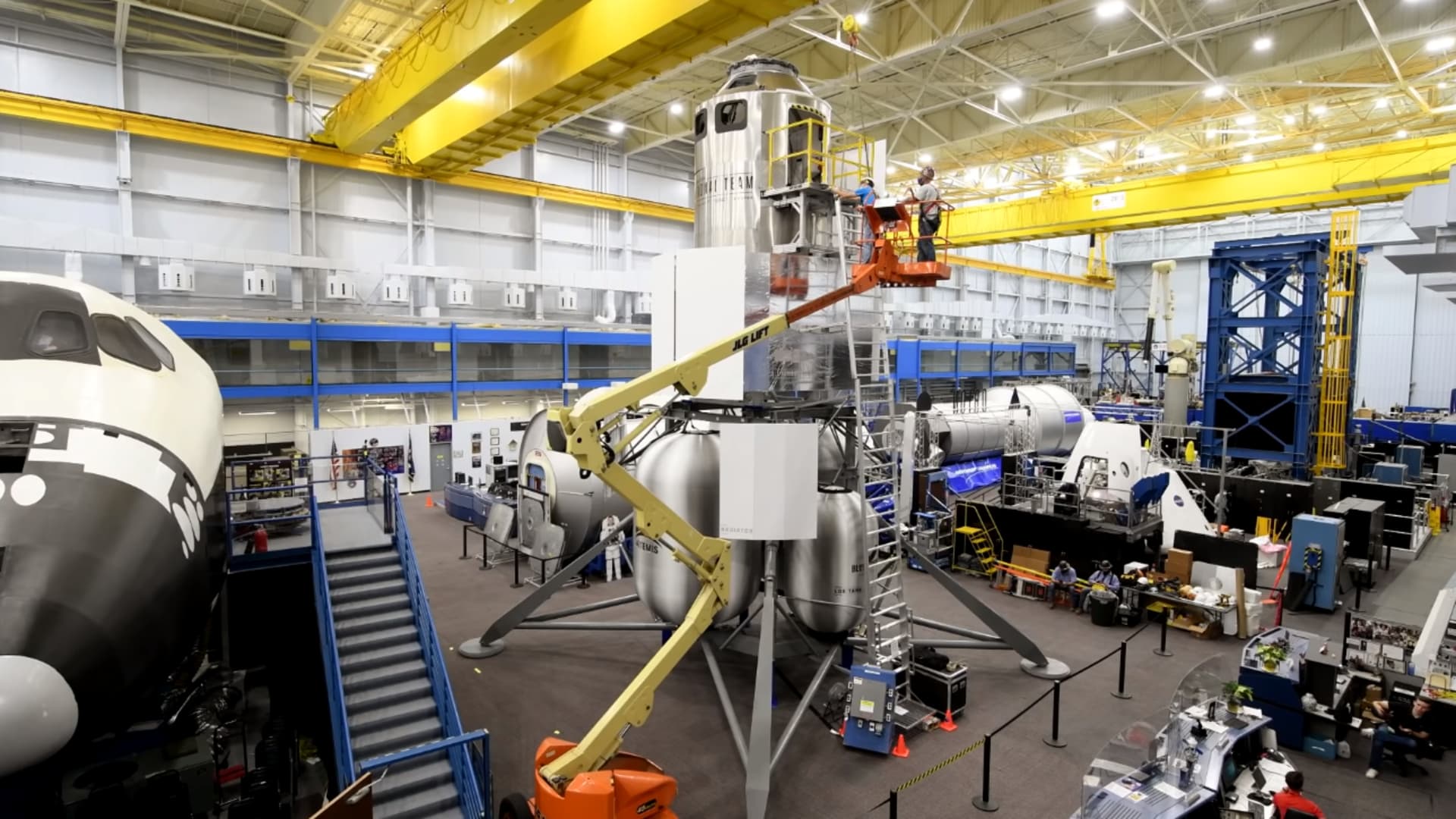
NASA's Human Landing System program is one of the critical pieces of the agency's plan, known as Artemis, to return U.S. astronauts to the surface of the moon.
Last year, NASA handed out nearly $1 billion in concept development contracts for HLS — with SpaceX receiving $135 million, Leidos' subsidiary Dynetics receiving $253 million and Blue Origin receiving $579 million. The space agency then expected to award two of those three companies hardware development contracts this year. However, following a shortfall in requested funding for HLS from Congress, NASA decided to give only SpaceX a contract, worth about $2.9 billion.
Blue Origin and Dynetics each quickly filed protests with the U.S. Government Accountability Office, which halted NASA's work on the program until the protests could be resolved. The GAO on July 30 upheld NASA's decision. On Aug. 16, Blue Origin took its battle a step further, suing NASA in the U.S. Court of Federal Claims.
NASA has paid $300 million of its SpaceX contract so far, with the payment made on the day the GAO denied the protests. However, the space agency's work on HLS has once again halted — this time due to the Blue Origin lawsuit, according to court filings Thursday — and will not resume until Nov. 1.
Major delays
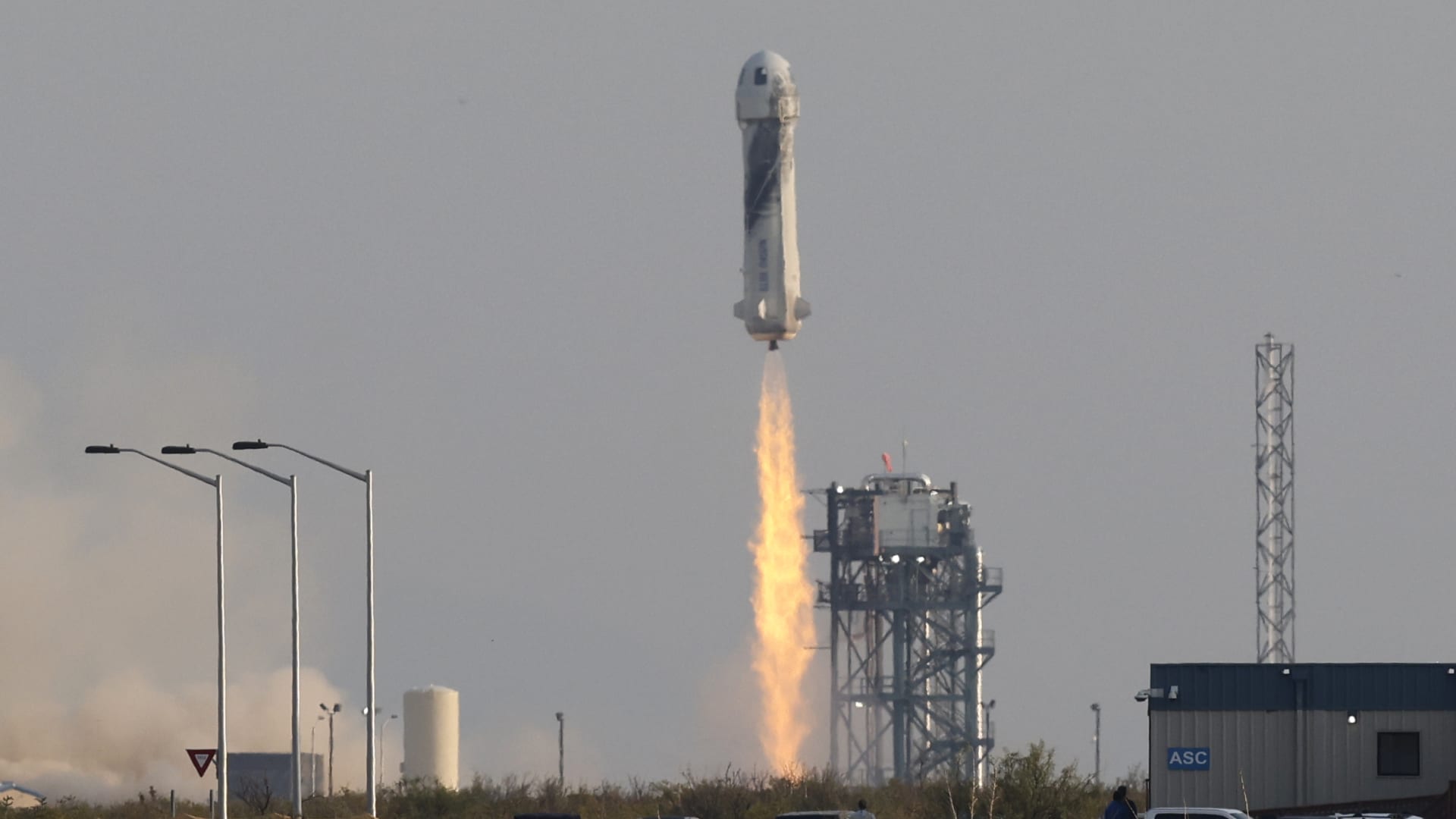
Blue Origin has struggled to deliver on multiple major programs since Bezos hired Smith as CEO in 2017. Bezos founded the company in 2000, with the goal of creating "a future where millions of people are living and working in space to benefit Earth." Delays — although common in the industry, in which the adage "space is hard" is persistently heard — have pushed back Bezos' vision, highlighted by the departure of Blue Origin's chief operating officer late last year.
Bezos launched to the edge of space as one of the members of the first crew onboard Blue Origin's reusable New Shepard rocket. While the company has not disclosed pricing, New Shepard competes with Virgin Galactic in the realm of suborbital space tourism, with Blue Origin having sold nearly $100 million worth of tickets for future passenger flights. Although the first crewed New Shepard launch was a smooth success, Blue Origin's leadership had previously expected the rocket to begin launching people by the end of 2017.
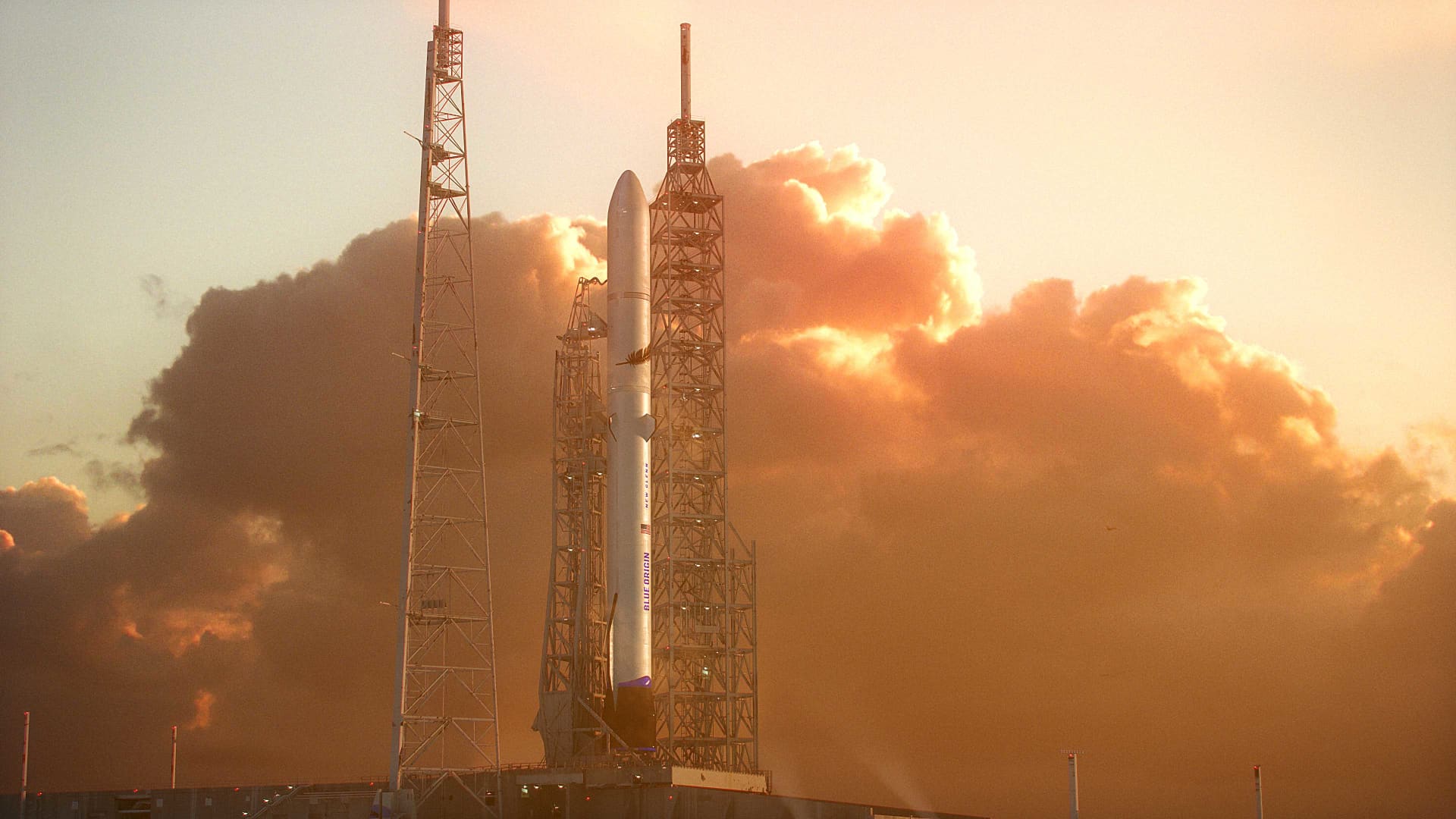
New Glenn is the reusable, next-generation rocket that Blue Origin is developing but has yet to launch. Originally slated for an inaugural flight in 2020, the first New Glenn is not expected to lift off until the fourth quarter of 2022. That's despite Blue Origin receiving $255.5 million from the U.S. Air Force to help develop the rocket. But the Pentagon did not choose New Glenn for further contracts last year, instead selecting SpaceX and ULA for multiple awards, cumulatively worth billions of dollars — a loss that Blue Origin cited when it announced New Glenn's delay.
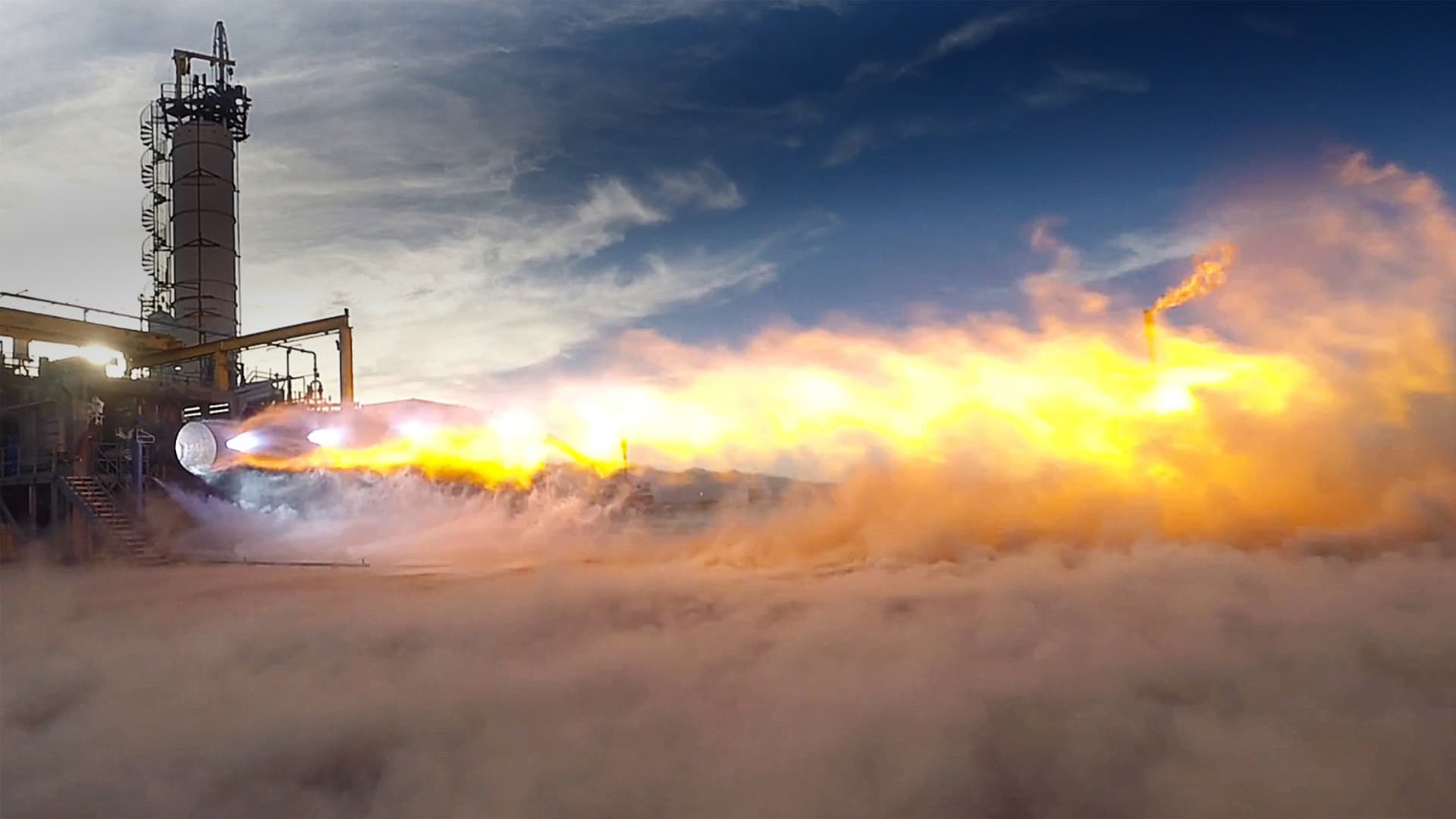
Blue Origin's third major program is its stable of rocket engines, headlined by the BE-4, which will power its New Glenn rocket. The company previously said that its BE-4 engines would be "ready for flight in 2017."
However, four years later, development issues and a lack of hardware for testing quickly mean Blue Origin has yet to deliver its first flight engines, ArsTechnica reported earlier this month. The company is pushing to have two BE-4 engines ready by the end of this year. Notably, BE-4s are important beyond Blue Origin, as ULA signed a deal to use the engines to power its Vulcan rockets, choosing Blue Origin over Aerojet Rocketdyne as its supplier. ULA is pushing to have its first Vulcan rocket ready to launch by the end of this year, and Blue Origin's BE-4 engines are expected to be a — if not the — final piece added before launch.
Bezos has spent the majority of his time in the past two decades focused on Amazon, but along the way has steadily sold pieces of his stake in the tech giant to fund Blue Origin's development — to the tune of $1 billion a year, or possibly more. Last month, Bezos stepped down as Amazon CEO, with many in the space industry expecting him to spend more time focusing on his space company.
Become a smarter investor with CNBC Pro.
Get stock picks, analyst calls, exclusive interviews and access to CNBC TV.
Sign up to start a free trial today.






